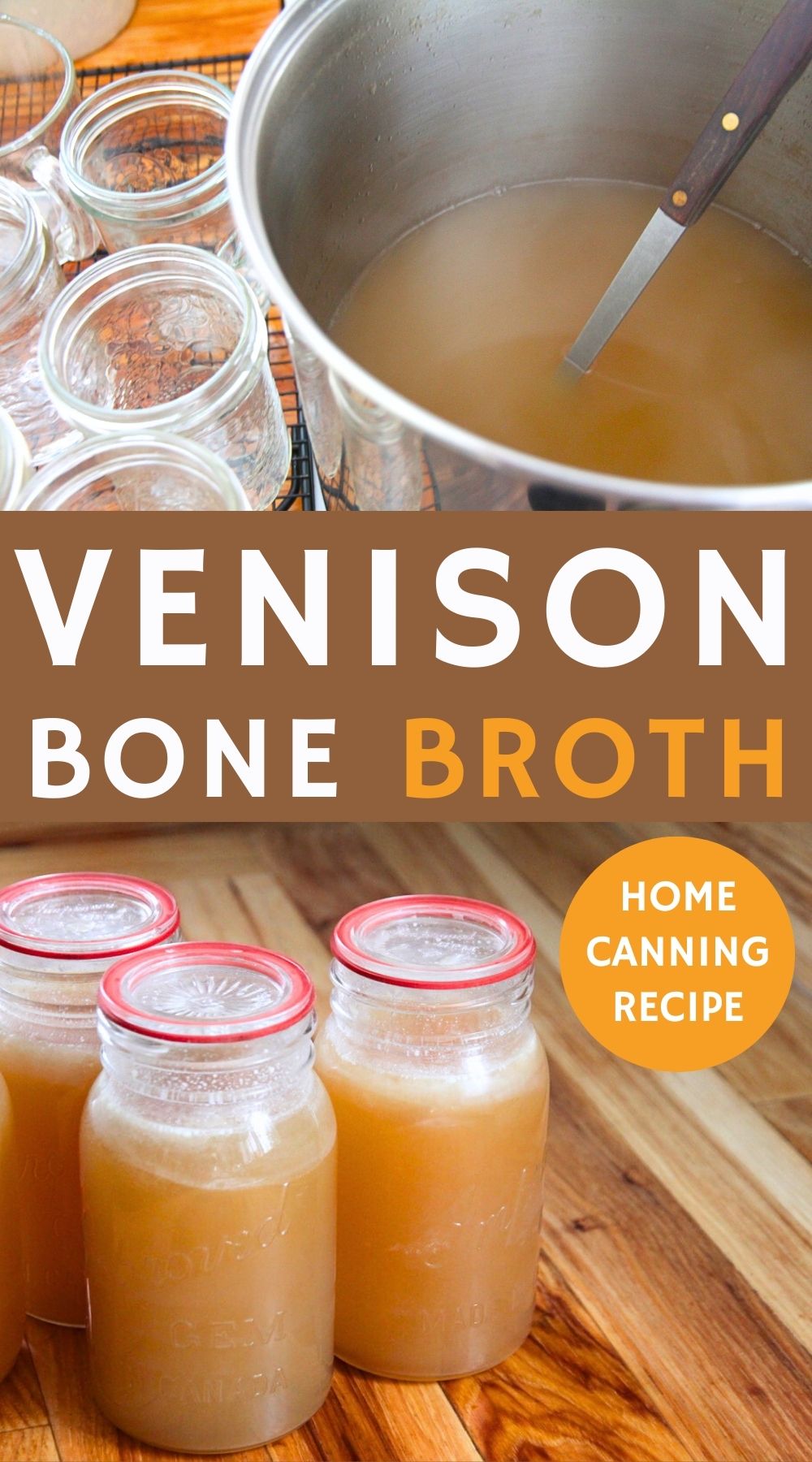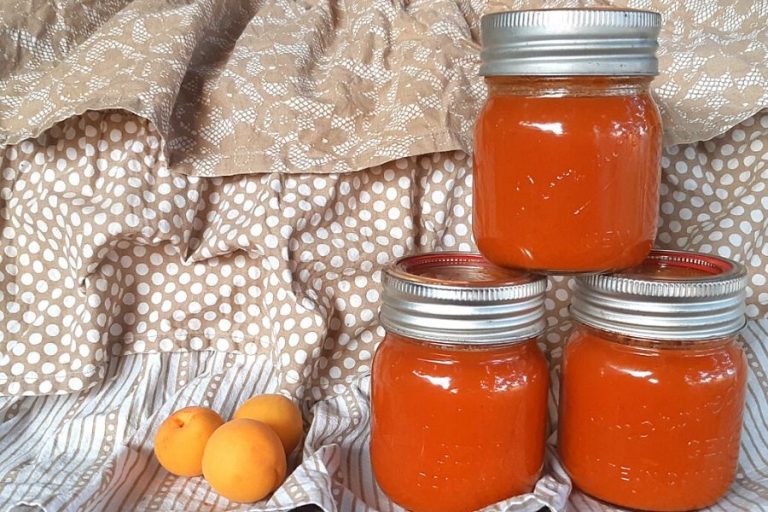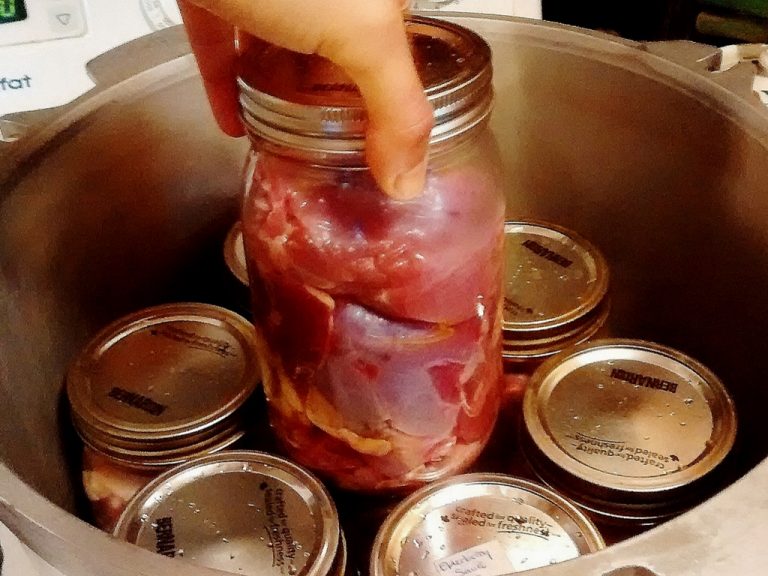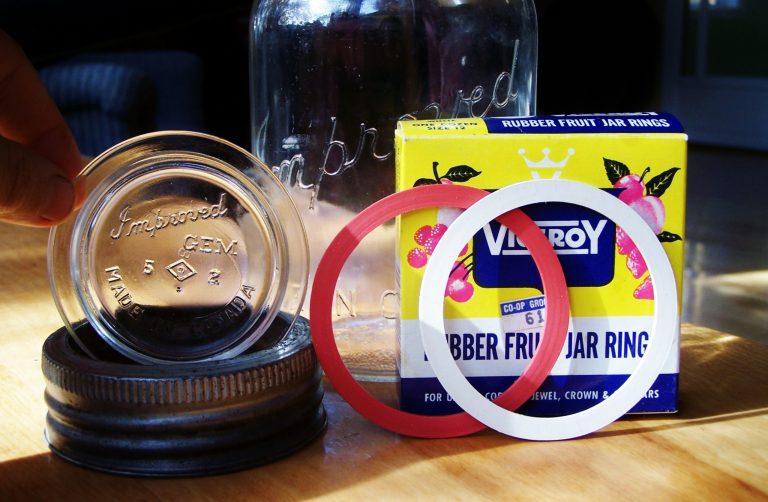How to Can Homemade Venison Bone Broth or Stock
Pressure canning your own venison bone broth is a great way to keep it on hand for later use. Just pop open a lid and you'll have delicious homemade stock for making venison stew, venison pot pie, venison gravies and more!

If you live where there is an abundance of big game, hunting is a great way to put clean meat on the table and nutritious broth in the soup pot.
My man and I were both raised in hunting families, but only returned to it after we were married. Being frugal by nature, we didn't want anything to go to waste from the animals we harvested.
And so, we started using the bones to make a rich and delicious venison stock. It worked to freeze broth in plastic bags or glass jars. But it was a hassle. Sometimes jars broke if I overfilled them and bags of frozen broth were awkward to stack and store.
When I realized you could easily pressure can homemade venison bone broth, I was eager to try.
Today, home canning is really the only way I preserve deer broth (or any kind of broth, for that matter!),
Tools You'll Need
- large stockpot (I use this 20 quart pot/canner combo)
- large spoon or meat fork
- large bowl
- sieve or cotton cloth for straining
- pressure canner (I use the All American Pressure Canner)
- 7 quart jars
- 7 canning lids
- canning funnel
- ladle
- cooling rack
I like to use a giant, 20 quart stockpot on the stove top for making deer bone broth, so I can make a lot all at once. But you can also use a slow cooker, an instant pot or pressure cooker.
Just remember you can't safely use any of these tools when actually canning your own venison stock. I should also mention a water bath canner doesn't reach temperatures high enough to preserve meat products either.
You need a weighted gauge canner or a dial gauge canner to safely can homemade bone broth.

Ingredients
- deer bones
- salt
- optional: apple cider vinegar
- optional: fresh herbs for flavor
- optional: veggie scraps like onion peels, carrot peels, celery tops, etc.
How to Make Venison Bone Broth for Pressure Canning
It's easy to make your own stock. All you need are deer bones, water and salt. You can also add in onions, garlic or veggies scraps for additional flavor, if you like.
I have a complete guide to making deer bone broth where I show you how to make large amounts on the stove or in the oven.
But let me quickly give you a great way to turn a lot of venison bones into homemade stock on the stove top.
- Cut deer bones to length, so they'll fit in your largest stockpot (I like to use a 20 quart so I can do giant batches).
- Cover with cold water and set on the stove top to boil.
- When you reach a boil, turn burner down to low heat.
- Simmer for 2 hours, then lift bones and pull chunks of meat from them.
- Store deer meat in freezer bags and either refrigerate or freezer for later.
- Return bones to stockpot and top up with hot water.
- Boil for 6-10 hours or until connective tissue disintegrates.
- Line a large bowl with a strainer or cotton cloth and pour homemade broth into it.
- Lift strainer and discard solids.
- Rinse your large pot, return deer bone broth to it and cool overnight or until fats solidify on the surface.
- Lift fats off (they aren't supposed to be canned) and then you're ready to reheat the homemade broth for pressure canning!
How to Can Homemade Venison Bone Broth
Broth always calls for a hot pack canning, as outlined by the National Center for Home Food Preservation. Hot pack simply means the broth needs to be hot when it goes into jars. Here are step by step directions.
Set your large pot of strained broth on the stove and turn to high heat. While you're waiting for the broth to boil, add water to your pressure canner according to manufacturer's instructions and also heat it on the stove.

Warm your quart jars at the kitchen sink by running hot water in them.
When your broth has reached a boil, it's time to fill your jars. Be sure to use your funnel for this part of the process!
Add 1 teaspoon of salt to each jar and fill with hot broth. Leave an inch of headspace (open space) at the top of each jar.
Wipe the rim of the jar, then add a lid and canning band. Tighten bands to fingertip tightness and place jars in hot canner.

Once the canner is full, tighten down pressure canner's lid.
Processing time for quart jars is 25 minutes. Just adjust pounds of pressure according to your altitude and canner type (see printable below for details).
After you've processed jars at the right pounds of pressure, let dial return to 0 before removing the lid.
Lift hot jars using a jar lifter and set on a cooling rack. Leave them for 8-12 hours or until they return to room temperature.
Test each one to see if they sealed. Any jars that failed can be pour back into the broth pot for re-canning, or you can refrigerate and use in a week.
Jars that have a proper seal should have bands removed. They can be put on a shelf for long-term storage and will keep for 12 months.

Ways to Use Canned Venison Bone Broth
You can substitute venison bone broth for beef broth in just about any recipe. Here are some ideas to help you along.
- deer pot pies
- deer stew
- venison chili
- venison and potato soup
- venison gravy (for venison roast and mashed potatoes)
- wild game dumplings
Interested in learning more about pressure canning wild game, fish, soups and more?
Check out the sale on my Pressure Canning Course for Beginners!
How to Pressure Can Deer Broth or Stock
Equipment
- large stockpot
- large spoon or meat fork
- large bowl
- colander or straining cloth
- pressure canner
- 7 quart jars
- 7 canning lids and bands
- canning funnel
- kitchen ladle
- cooling rack
Materials
- deer bones to fill stock pot
- 7 teaspoons salt
- apple cider vinegar (optional)
- raw veggie scraps (optional)
- fresh herbs (optional)
Instructions
How to Make Deer Broth on the Stove
- Place deer bones in your largest stockpot and cover with water.
- Simmer on stove for 2 hours.
- Remove bones and pull chunks of meat from them.
- Bag meat and refrigerate or freeze.
- Return bones to stockpot and simmer 6-10 hours.
- Strain solids out and let broth cool, until fat solidifies on the surface.
- Lift with spoon and reheat broth for canning.
How to Pressure Can Deer Stock
- Add water to and preheat pressure canner on the stove.
- Set broth on stove top and bring to a boil.
- Heat canning jars by running hot water into them at your kitchen sink.
- When broth boils, fill your hot quart jars, leaving 1 inch headspace.
- Add 1 teaspoon salt per jar.
- Wipe rims, adding a canning lid and band.
- Tighten to fingertip tightness and place in your pressure canner.
- Fasten canner's lid down and process quarts for 25 minutes, adjusting pounds pressure according to canner type and altitude (see notes below).
- Let canner return to 0 pounds of pressure and remove lid.
- Lift hot jars and set on cooling rack.
- Leave undisturbed for 8-12 hours or until they return to room temperature.
- Test for a seal; any jars that didn't seal should be refrigerated or returned to the broth pot, while sealed jars can be stored on a pantry shelf.
- Use sealed jars in a year's time.
Notes
- Pints-20 min
- Quarts-25 min
- 0-2,000 ft: 11 lb
- 2,001-4,000 ft: 12 lb
- 4,001-6,000 ft: 13 lb
- 6,001-8,000 ft: 14 lb
- 0-1,000 ft: 10 lb
- 1,001-8,000: 15 lb






